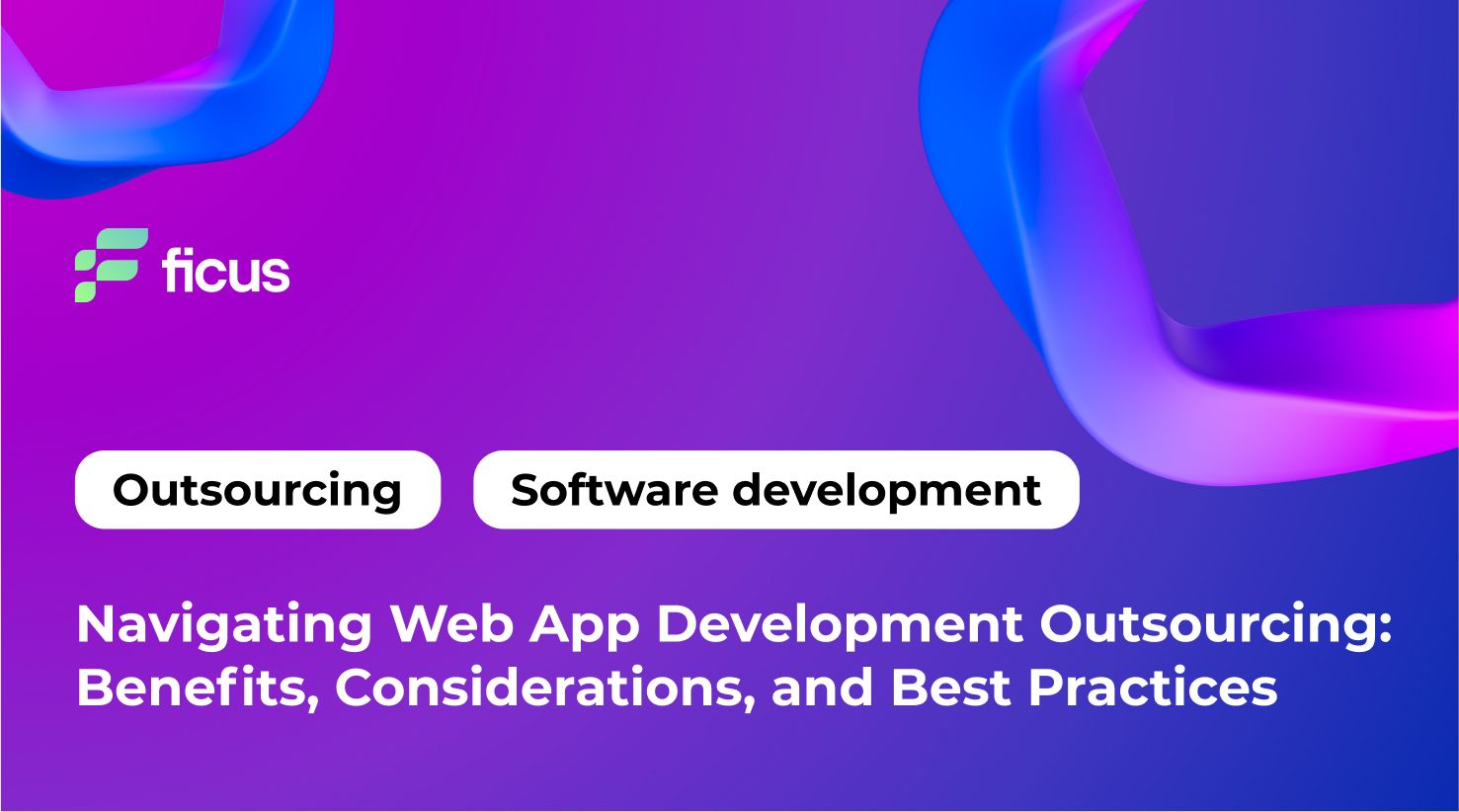In the rapidly evolving digital world, outsourcing web app development has become a key strategy for businesses to stay competitive. By tapping into external expertise, companies can efficiently manage their web development projects, meeting business objectives without the burden of maintaining an in-house team. This approach allows businesses to focus on their core operations while gaining access to top-tier talent and specialized skills globally.
Creating a successful web application requires a mix of technical know-how, creativity, and strategic planning. For many businesses, handling this in-house may not always be the most efficient or cost-effective option. Outsourcing web app development presents a compelling alternative, offering numerous advantages
Proper management of the outsourcing process ensures that the development aligns with your business needs and delivers the desired outcomes.
- Outsourcing web app development is a strategic choice for startups and established companies.
- Benefits include cost savings, access to a global talent pool, and risk sharing.
- Tips for successful outsourcing: effective communication, clear objectives, trust, and cultural sensitivity.
What is Web App Development Outsourcing?
Web app development outsourcing involves contracting external agencies or freelancers to handle the creation, design, and management of web applications. This can include tasks such as coding, front-end and back-end development, user interface design, and server management. By outsourcing these tasks, businesses can tap into a global pool of talent, benefit from diverse expertise, and often achieve cost savings compared to maintaining an in-house team.
Outsourcing can be done to firms or freelancers located in the same country (onshore), nearby countries (nearshore), or distant countries (offshore). This approach allows businesses to access a broader talent pool, focus on core activities, and often benefit from time zone differences, ensuring continuous progress on the project.
Benefits of Outsourcing Web App Development
- Cost Savings: One of the primary benefits of web app development outsourcing is cost savings. By outsourcing, businesses can significantly reduce operational expenses associated with hiring and maintaining an in-house development team. This includes savings on salaries, benefits, office space, and training. Outsourcing allows companies to access affordable talent from regions with lower labor costs, while still benefiting from high-quality work. This cost efficiency can free up the budget for other strategic initiatives or investments.
- Access to Expertise: Outsourcing provides access to a broad pool of specialized skills and advanced technologies. Development partners often have deep expertise in various programming languages, frameworks, and tools that may not be available internally. Whether it’s front-end development using cutting-edge JavaScript libraries or back-end solutions involving complex server architectures, outsourcing ensures that businesses can leverage the best available talent and technologies for their projects.
- Scalability: Flexibility is another significant advantage of outsourcing web app development. Companies can easily scale resources up or down based on project requirements and business needs. This scalability allows businesses to adapt to changes in demand, manage varying project sizes, and respond quickly to market shifts. By adjusting the scale of their outsourced team, businesses can ensure that their development efforts are aligned with their current priorities and goals.
- Focus on Core Business: Outsourcing web app development enables in-house teams to focus on their core business functions and strategic objectives. With technical aspects handled by external experts, internal resources can concentrate on driving business growth, innovation, and customer engagement. This shift in focus can enhance overall organizational efficiency and effectiveness, allowing businesses to achieve their strategic goals more effectively.
- Faster Time-to-Market: Outsourcing can significantly accelerate the development process, leading to a faster time-to-market for web applications. External teams often have established workflows and methodologies that streamline development, testing, and deployment. This efficiency reduces the time required to bring a web app from concept to launch, enabling businesses to capitalize on market opportunities and meet customer needs more quickly.
Key Considerations When Outsourcing Web App Development
- Choosing the Right Vendor: Selecting the right vendor is crucial for the success of web app development outsourcing. Businesses should evaluate potential partners based on their experience, portfolio, and client reviews. An experienced vendor with a strong track record in delivering successful projects will likely be more reliable and capable of meeting project requirements. Reviewing past work and client feedback can provide valuable insights into the vendor’s capabilities, quality of work, and overall performance.
- Communication and Collaboration: Effective communication and collaboration are essential for successful outsourcing partnerships. Establishing clear communication channels and protocols ensures that both parties are aligned on project goals, timelines, and expectations. Regular updates, feedback sessions, and transparent communication help to prevent misunderstandings and keep the project on track. Tools and practices for effective collaboration, such as project management software and regular check-ins, can enhance the overall efficiency of the development process.
- Cultural and Time Zone Differences: Cultural and time zone differences can pose challenges in outsourcing web app development. These differences may affect communication, workflow, and project management. To overcome these challenges, businesses should establish strategies for managing cultural diversity and time zone disparities. This can include setting overlapping working hours for meetings, using collaborative tools that facilitate communication, and fostering an understanding of cultural differences to ensure smooth interactions.
- Quality Assurance: Maintaining high standards and consistency in development is crucial for the success of outsourced projects. Businesses should implement quality assurance practices to ensure that the final product meets their expectations and industry standards. This includes defining clear quality criteria, conducting regular testing, and reviewing deliverables at various stages of the development process. Ensuring that the outsourcing partner follows best practices for quality assurance can help mitigate risks and deliver a reliable web application.
- Data Security and Compliance: Data security and compliance are critical considerations when outsourcing web app development. Businesses must ensure that their outsourcing partners adhere to strict data protection protocols and comply with relevant regulations. This includes safeguarding sensitive information, implementing secure development practices, and addressing any legal or regulatory requirements. Establishing clear agreements and protocols for data security can help protect valuable information and maintain compliance throughout the development process.
Ready to Optimize Your Web App Development? Let’s Get Started!<br>
Contact UsBest Practices for Successful Web App Development Outsourcing
Define Clear Objectives and Requirements:
For effective web app development outsourcing, it’s essential to define clear objectives and requirements from the outset. This means providing detailed project specifications, including the desired features, functionality, and design elements of the web app. Clear documentation helps ensure that both the business and the outsourcing partner have a mutual understanding of the project goals and expectations. By outlining these details, businesses can avoid misunderstandings, reduce the risk of scope creep, and facilitate a smoother development process.
Establish Strong Communication Channels:
Establishing strong communication channels is vital for successful web app development outsourcing. Regular updates and meetings help maintain alignment between the business and the outsourcing partner. Utilizing project management tools, such as Slack, Trello, or Asana, can facilitate real-time communication and keep all stakeholders informed. Scheduled meetings, whether virtual or in-person, allow for discussions on progress, feedback, and any issues that may arise. Effective communication ensures that the project stays on track and that any adjustments or concerns are addressed promptly.
Set Realistic Timelines and Budgets:
Setting realistic timelines and budgets is crucial for managing web app development outsourcing projects effectively. Accurate planning involves estimating the time required for each phase of development, including design, coding, testing, and deployment. Similarly, establishing a clear budget helps prevent financial overruns and ensures that the project remains within the allocated resources. By setting achievable timelines and financial expectations, businesses can better manage their projects and avoid delays or unexpected costs.
Monitor Progress and Performance:
Monitoring progress and performance is an important practice in web app development outsourcing. Tracking milestones and deliverables helps ensure that the project is advancing according to plan. Regular reviews of work completed, adherence to timelines, and achievement of key milestones are essential for maintaining quality and meeting deadlines. Utilizing project management tools and setting up regular check-ins with the outsourcing partner can provide visibility into progress and help address any issues or deviations from the project plan.
Build a Partnership Approach:
Building a partnership approach is key to successful web app development outsourcing. Fostering collaboration and mutual trust between the business and the outsourcing partner creates a positive working relationship and enhances project outcomes. This involves treating the outsourcing team as a valuable extension of the business, sharing insights and feedback openly, and working together to overcome challenges. A collaborative mindset helps ensure that both parties are invested in the project’s success and can lead to more innovative solutions and higher-quality results.
Common Pitfalls to Avoid
- Inadequate Research: One common pitfall in web app development outsourcing is inadequate research when selecting a vendor. Failing to thoroughly evaluate potential partners can lead to issues with project quality, missed deadlines, and budget overruns. It is crucial to assess a vendor’s experience, review their portfolio, and check client testimonials before making a decision. In-depth research helps ensure that the chosen partner has the necessary skills, and a proven track record, and aligns with your project’s specific needs and goals.
- Unclear Contracts and Agreements: Another significant pitfall is entering into contracts and agreements that are unclear or incomplete. Unclear contracts can lead to misunderstandings about project scope, deliverables, timelines, and costs. To avoid this, ensure that all terms are well-defined and documented. This includes detailed specifications, payment terms, deadlines, and responsibilities. Clear agreements help prevent disputes and provide a solid foundation for managing the project effectively.
- Neglecting Documentation: Neglecting documentation can undermine the success of web app development outsourcing projects. Keeping comprehensive records of project progress, including design changes, coding updates, and feedback, is essential for tracking development and ensuring alignment with project goals. Detailed documentation provides a reference for both parties and helps address any issues or changes that arise during the project lifecycle.
4. Ignoring Post-Launch Support: Ignoring post-launch support is a common oversight in web app development outsourcing. After the initial launch, ongoing maintenance and updates are crucial to ensure the web app remains functional, secure, and up-to-date. Planning for post-launch support, including bug fixes, performance improvements, and feature updates, helps maintain the web app’s effectiveness and longevity. Establishing a support plan with the outsourcing partner can ensure that these needs are addressed promptly and effectively.
Case Studies and Real-World Examples
- E-Commerce Platform for a Retail Brand A leading retail brand outsourced the development of its e-commerce platform to a specialized web development firm. The project involved creating a custom platform with integrated payment processing and user-friendly design. The outsourcing partner brought expertise in building scalable, secure systems, and delivered the project on time and within budget. The platform’s successful launch boosted the client’s online sales and customer engagement.
- Mobile App for a Healthcare Provider A healthcare provider needed a mobile app to streamline patient scheduling and communication. They outsourced the development to a team with expertise in healthcare applications. The project included features like appointment booking, patient records access and secure messaging. The outsourced team delivered a high-quality app that improved patient satisfaction and operational efficiency for the provider.
Lessons Learned and Key Takeaways
- Thorough Vendor Evaluation: Both examples highlight the importance of thoroughly evaluating vendors to ensure they have the necessary expertise and experience. Choosing the right partner is crucial for achieving project success.
- Clear Requirements and Communication: Effective communication and well-defined requirements were key factors in the success of both projects. Ensuring that all project details are clear and regularly communicated helps prevent misunderstandings and keeps the project on track.
- Post-Launch Support: The importance of planning for post-launch support was evident in both cases. Ongoing maintenance and updates are essential for the long-term success of web applications.
Final Thoughts
Web app development outsourcing offers numerous benefits, including cost savings, access to specialized expertise, and scalability. However, to fully leverage these advantages and avoid common pitfalls, businesses must approach outsourcing with careful planning and consideration. Defining clear objectives, establishing strong communication, setting realistic timelines and budgets, and monitoring progress are key best practices for successful outsourcing. Additionally, avoiding pitfalls such as inadequate research, unclear contracts, and neglecting post-launch support will help ensure a smooth and effective development process.When it comes to outsourcing web app development, choosing the right partner can elevate your projects to new heights. Ficus Technologies is more than just a partner; we’re your gateway to success. With us, you’re not just outsourcing; you’re embarking on a journey toward excellence in web app development. Trust our expertise and experience to make a significant impact on your outsourcing needs. Partner with us today and achieve remarkable digital milestones together. For any questions or to start your project, contact Ficus Technologies, a leading software development and IT staffing company dedicated to bringing your ideas to life.
The main difference between a web app and a website lies in its functionality and user interaction. A website is generally a collection of static or dynamic pages designed to provide information. It serves as a platform for users to read content and navigate through various sections, such as blogs, company profiles, or news portals. On the other hand, a web app is a more complex, interactive application built to perform specific tasks or functions. Web apps enable users to manage accounts, process transactions, or interact with databases. Unlike websites, web apps often involve user authentication and require dynamic interactions and backend processes.
The costs for web app development outsourcing can vary widely depending on several factors. These include the complexity of the project, which encompasses the features, integrations, and custom functionalities required. The scope of work, including design, development, testing, and deployment, also impacts the cost. Additionally, the location of the outsourcing partner plays a role, as costs can differ based on the geographical area. The expertise and experience of the development team and the project’s duration further influence the overall cost. Generally, simpler web apps might cost a few thousand dollars, while more complex, enterprise-level applications could reach in the hundreds of thousands. It’s crucial to obtain detailed estimates to understand what is included and avoid unexpected expenses.
A well-rounded web app development outsourcing contract should clearly outline the project scope and specifications, including detailed descriptions of requirements, features, and functionalities. It should specify the project timeline and milestones, with defined deadlines for each phase. The contract must detail the budget and payment terms, including payment schedules and any financial arrangements. The roles and responsibilities of both parties should be defined, covering development, testing, and deployment tasks. Communication channels and reporting procedures should be established to ensure regular updates and alignment. Quality assurance criteria, including testing and acceptance standards, should be outlined. The contract should also address intellectual property rights, confidentiality, and data security measures. Additionally, it should include provisions for post-launch support and maintenance, as well as terms for termination and dispute resolution.








